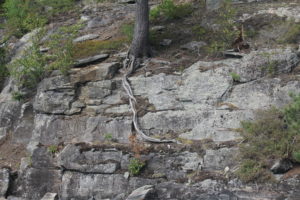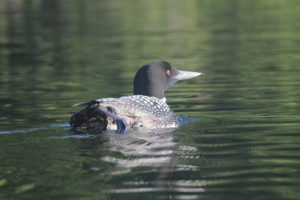TOLSTOY HAS THE WAY, NATURE THE EXAMPLES
The glories of Nature and a literary giant may seem an odd combination to help slow climate change, but in fact, they’re a perfect match. Nature provides the encouragement, the great Russian writer Leo Tolstoy penned the wisdom: “Everyone thinks of changing the world, but no one thinks of changing himself.”
The insight of that is borne out by ever-more conspicuous evidence of how rapidly things are hurtling from bad to worse: massive flooding in Asia, heatwaves scorching North America, wildfires rampant in Europe.
To mitigate such catastrophes while solutions are being pursued, Tolstoy’s dictum is an ideal guideline. A useful example is cattle ranchers who once blew up beaver dams and have learned to protect them instead. Beaver ponds now slake thirsty cattle in times of drought, slow torrents when there’s too much rain, widen wetlands that help create new meadows and buffers against wildfires.
Nature is replete with examples of survival by adapting, and while humans don’t have the advantage of evolution, we can take heart from evidence that adapting works.

Against seemingly impossible odds, pine trees can alter their roots to cling onto rocks gouged and shaped by the millennium-slow retreat of glaciers. The rate at which the rivers of ice are disappearing today is eroding our chances of avoiding disaster.
One way to help is adapting how we choose the arch enemies of sensible change; politicians. It won’t be easy.
SHORT-CHANGED
Albert Einstein believed that “The measure of intelligence is the ability to change.” But then, he was a genius. We’ve stuck ourselves with political leaders more wedded to money than morality and in some cases even common sense. It’s as much our own doing as climate change, because we have failed to insist on better ways to elect them.
The U.S. system demands and exalts massive amounts of lucre – cliché-dubbed by political writers as “war chests” — for campaigns that are supposedly to help candidates get elected to meet promises that will serve the voters. In reality, the biggest donations are down payments for backing the agendas of the contributors, which as often as not rate profit over the common good.
One of newly selected (NOTE: not ‘elected’) British Prime Minister Liz Truss’ first “promises” was not to pursue the idea of a “windfall tax” on energy producers. Given that they not only contribute massively to greenhouse gasses, but have been more than reluctant to offer expertise that can play a pivotal role in finding ways to cut them, that’s adapting to avarice over need.
Before Truss wrote her speech, BP posted second-quarter profits worth $8.5 billion, its biggest windfall in 14 years,. ExxonMobil’s $17.9 billion in net income was its largest-ever quarterly profit. Add in the balance sheets of Chevron, Shell and TotalEnergies and the five major oil companies made $55 billion this past quarter. Meanwhile, hundreds of millions of people around the world bear the brunt of surging energy and gasoline prices.
UN Secretary-General Antonio Guterres aptly called it “grotesque greed”.
If we actually do end up adapting enough to curb climate change, hopefully justice will be served and energy company CEOs will end up with begging bowls instead of bonuses.
“A BETTER MOUSETRAP”
To help that along, we can build better tools to adapt our lifestyles to the necessities of long-term survival. Again, Nature provides a fine example.
Among the most perfect owners of adapted “tools” is one regular Perch readers will not find surprising: loons.

Loon’s legs are placed far back on their body, making it difficult for them to walk on land, which might seem a drawback. But the position, and their large webbed feet, provide superb propulsion and steering to make them world-class underwater hunters.
The human equivalent is adapting a foot that eases up on the accelerator pedal. Not speeding or blasting away way from stop lights only to wait longer at the next one is an obvious “twofer”. It saves gas and deprives the oil companies of excessive profits to dole out bonuses and dividends instead of creating alternate energy sources.|
But then, the rest of us are hardly exemplary. If as much attention was paid to adapting our consumption lifestyles as is focused on re-working societal norms by interpreting the past through the prism of our own times (book-banning, ‘cancelling’ and various other ‘wokisms’ spring to mind), the world could be a cooler place in temperament, as well as temperature.
The Darwinian phrase “adapt or die” was used by apartheid-era South African President P.W. to convince Whites the odious system must end.
It is an apt one for the campaign – if such a word applies – to convince humans to change ourselves to help slow what at the moment feels like a hell-bent race to self-destruction.
Comments are welcomed. Click CONTACT on the site header.
To receive e‑mail alerts to new posts, Click SIGN-UP on the header.
3 thoughts on “TOLSTOY HAS THE WAY, NATURE THE EXAMPLES”
allen…that hell-bent race to self-destruction is
almost run…a mere 2 centuries ago the global
population was 1 billion of us…now the earth
is weighed down by 8 billion fellow travelers…
and 90% of us inhabit the industrialized and
mechanized northern hemisphere where pollution
is the new potentate and so goes the hell-bent
race toward mass suicide…medical advances and agricultural progress continue to allow
population growth and the finish line nears…
in a mere 20 years, yes, by 2050 our numbers
are projected to grow to 10 billion inhabitants…
the earth staggers under this weight as no consensus as how to fix our self-destructive nature appears in sight…
me gloomy?, you bet…aren’t you?
Gloomy? Up to a point, but I live in hope, too…
Unchecked growth is the logic of the cancer cell, writer Ed Abbey once said. Keep’em coming dear Allen.